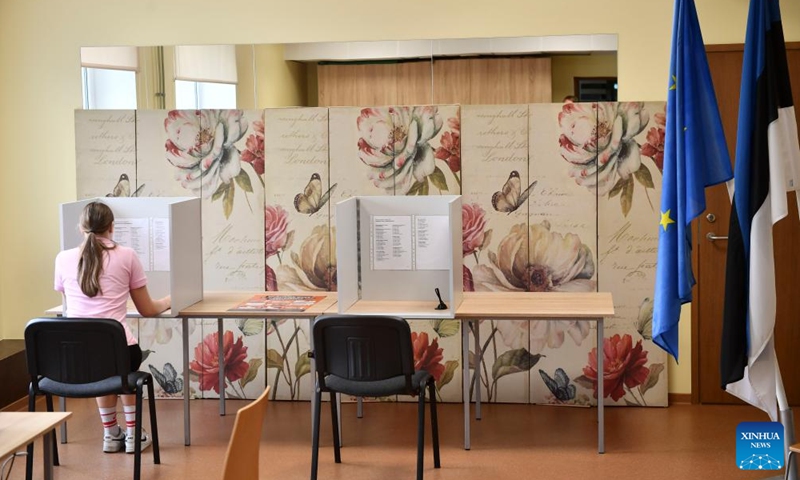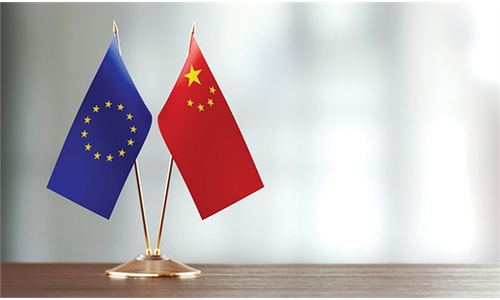Far-right gains ground in EU elections, exposing ‘deep discontent among European public’
Election result may influence bloc’s support for Ukraine; little impact on ties with China

A woman votes for the European Parliament elections at a polling station in Narva, Estonia, June 9, 2024. (Photo: Xinhua)
Far-right parties have made significant gains in the European Parliament elections, exposing the brewing dissatisfaction among the European public toward the "remote elites" in Brussels and their national governments in recent years, said Chinese experts. They believe that the election result not only showed that Europe is mired in deep political crisis, it also foreshadowed the continent becoming more conservative and far-right leaning. This trend will likely overturn Europe's policies on immigration, green transition and its support for Ukraine, they said.
The election, as significant as it is, won't have much direct influence on China-EU ties yet, said experts. They believe the trajectory of China-EU ties depends largely on whether the current obstacles will be further exacerbated or properly addressed. Who becomes next US president will have more direct and influential impact on EU's ties with China than the EU parliamentary elections.
Some ballots were still being counted Monday, but the outcome showed the 27-nation bloc's parliamentary membership had clearly shifted to the right, AP reported.
While the centre, liberal and Socialist parties were set to retain a majority in the 720-seat parliament, the vote dealt a domestic blow to the leaders of both France and Germany, raising questions about how the EU's major powers can drive policy in the bloc, according to Reuters.
Making a risky gamble to try to reestablish his authority, French President Emmanuel Macron called a parliamentary election, with the first round to be held on June 30 and July 7.
Like Macron, German Chancellor Olaf Scholz also endured a painful night in which his Social Democrats scored their worst result ever, suffering at the hands of the mainstream conservatives and hard right Alternative for Germany (AfD), Reuters reported.
Meanwhile, Italian Prime Minister Giorgia Meloni saw her position strengthened by her arch-conservative Brothers of Italy group winning the most votes, exit polls showed.
While some Western media said the elections showed "a rightwards shift inside the European Parliament," Cui Hongjian, a professor with the Academy of Regional and Global Governance with Beijing Foreign Studies University, said that the election shows that the rise of right-wing forces inside the EU has already become a trend, and predicted that Europe will continue turning conservative and right-leaning, as the mainstream parties have failed to curb the right-wing forces in the past five years.
The election result can be seen as a protest from Europe's public toward the "remote elite" in Brussels and their national governments, believing the incumbent officials have failed in many fields, including the economy and the Russia-Ukraine conflict, Wang Yiwei, a professor at the School of International Relations at Renmin University of China, told the Global Times on Monday.
"Europe is mired in deep crisis now. The continent's current political elites' rule has failed to solve its problems," said Wang.
Chinese experts predicted that if France's far-right leader Marine Le Pen wins a parliamentary majority, Macron would be left with little sway over domestic affairs, and that would be a turning point for European's politics to enter a far-right era.
However, the extent to which the rising right-wing forces will really influence future EU policy remains to be seen.
The majority of seats in the EU chamber where the bloc's laws are debated, modified, passed or rejected, remain firmly in the hands of centrist parties. To affect EU policy, hard-right parties from across the bloc will have to unite in order to give them clout, according to BBC.
Chinese experts believe the elections will have a significant impact on Europe's immigration, security and green transition policies, as those are the topics the public is mostly unsatisfied with and where the right-wing parties' policies gained points.
Some of the EU's right-wing forces also have some deep-seated differences with the mainstream parties in Europe over the Russia-Ukraine conflict. This means that with those right-wing parties gaining power in European Parliament, there could be more supportive voices for Russia, Song Luzhen, a researcher at the China Institute of Fudan University, told the Global Times. However, he stressed that the European Parliament does not have much binding power, thus the influence on the Russia-Ukraine conflict is not obvious at this moment.
Le Pen once said she opposes sending heavy tanks to Ukraine, fearing it could escalate the ongoing conflict with Russia.

Students shout during a demonstration to protest against the rise of far-right parties in front of the Henri IV high school in Paris on June 10, 2024, a day after the European Parliament elections. Photo: AFP
Internal politics
When reporting the elections, some international media predicted they would shape how the European bloc confronts challenges, including increased industrial rivalry with China and the US.
Cui believed that the European Parliament elections were mostly a reflection of domestic politics, and its impact on foreign policy won't immediately be manifested. "The impact on EU-China relations will depend on a reshuffle of the European Union's top jobs later this year, and depends on whether the current problems in China-EU relations will be further exacerbated or properly addressed," Cui said.
One certain thing is that the rising conservatism in European politics will lead to a more protectionist stance on economic and trade issues within the bloc, said Cui. EU may tend to place more emphasis on its internal affairs and prioritize national interests in the future, Cui said, indicating this could be a potential flashpoint that triggers more frictions in bilateral ties.
But in general, the result of the US presidential election will exert a more direct and greater influence on EU-China ties than the parliamentary elections, said Cui.
Last month, authorities of the island of Taiwan announced that they will closely monitor several upcoming elections on the European continent, including the EU elections in June, to see if cross-Straits policies will be affected.
In 2021, Wang Wenbin, the then spokesperson of China's Ministry of Foreign Affairs, said China strongly condemned and firmly rejected the so-called report on political relations and cooperation between the EU and Taiwan adopted by the European Parliament, and urged the European Parliament to immediately stop its words and deeds that undermined China's sovereignty and territorial integrity.
Wang made the remarks at a daily news briefing when answering a question on the adoption of a so-called report on political relations and cooperation between the EU and Taiwan by the European Parliament.
Song brushed off the possibility that the result of the European Parliament elections could change EU's policies on the island of Taiwan. "Several people from the European Parliament visited the island of Taiwan in recent years, as a result of pandering to US hype on the Taiwan question or sending wrong signals to Taiwan secessionists. And the European Parliament's non-binding bills on Taiwan are just a piece of waste paper that have no effect whatsoever," said Song.

